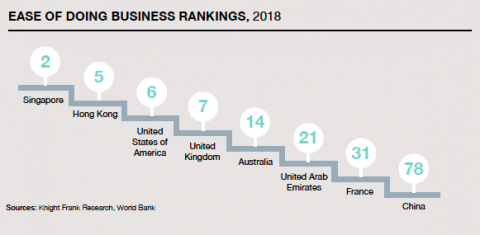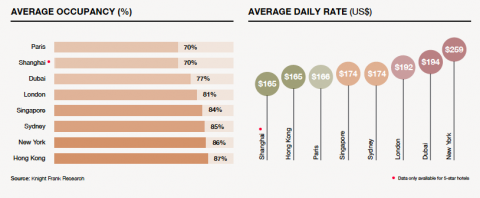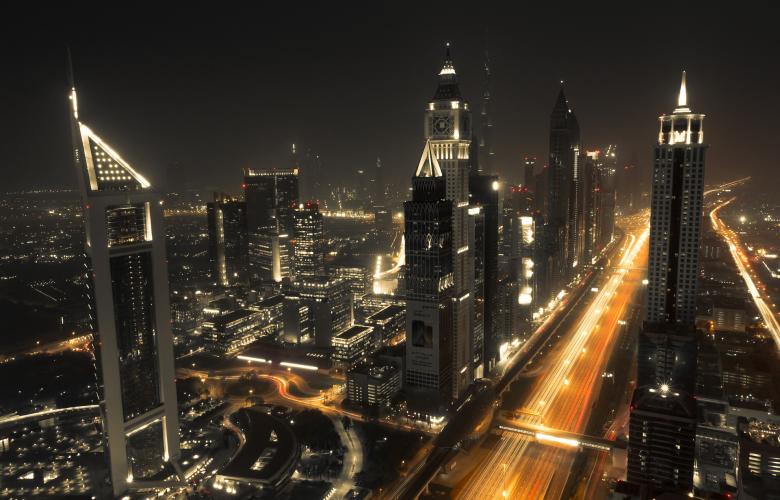Dubai’s status as a global hub continues to strengthen
Dubai’s status as a global hub continues to strengthen
Knight Frank's ‘The Hub Report 2018’ details growth in Dubai's industrial, financial, hospitality and residential sectors.
Dubai’s transformation and development over the last decade is unmatched in the region, and arguably even globally. To highlight this, Knight Frank has compared seven key global hub cities- Shanghai, New York, Hong Kong, London, Paris, Sydney and Singapore- across four sectors to showcase Dubai’s global standing.
The findings, detailed in ‘The Hub Report 2018’ show growth in the industrial, financial and business services, hospitality and residential sectors.
At a glance:
- Dubai is now ranked the third best in the world for transport and infrastructure
- Dubai International Financial Centre (DIFC) was recently ranked among top 10 global financial centres
- Dubai's hospitality sector is driven by increasing demand from both new and existing markets.
- In the residential property sector, Dubai has remained attractive to investors and occupiers alike
The Knight Frank Report states that over the 10 years to 2017, the industrial and logistics sector recorded anaemic growth of 10.7% in Dubai, compared to the Hong Kong (42.0%), Singapore (59.6%) and Shanghai (85.8%). To support this sector’s growth, Dubai has invested heavily in transport and infrastructure improvements, which as a result is now ranked the third best in the world. Dubai’s expected industry growth rate of 57.4% over the 10 years to 2027, is expected to outpace those in other global hub cities detailed in the report.
The domestic financial and business services sector grew 55.6% in the last decade with only Shanghai (114.3%) outperforming Dubai, according to the Knight Frank report. Over this time period, Dubai has been accepted as a global financial centre; with The Dubai International Financial Centre (DIFC) recently being ranked among top 10 global financial centres in The Banker’s International Financial Centre rankings. The UAE has a well-regarded in terms of ease of doing business, where has moved up from 26th to 21st in this ranking out of 190 countries over the last year. Continuing developments in improving business legislation and a maturing market means that this score is likely to continue to improve, says Knight Frank.

Dubai has moved up from 26th to 21st on the Ease of Doing Business Rankings. Image credit: Knight Frank
In the hospitality sector, the total number of hotel room keys per person is very high at 29.9 per 1,000 people in Dubai, compared to other hub cities detailed in the report. The surge in the number of keys produced has been driven by increasing demand from both new and existing markets. The world’s largest airport by international traffic, Dubai International Airport, recorded 83.7 million passengers in 2016, up 26% from 2014.

The Knight Frank report details key indicators in the hospitality sector in Dubai. Image credit: Knight Frank
Finally, in the residential sector, Dubai’s market has experienced a slowdown since 2015 with prime prices falling by 3.8% in the year to Q3 2017, with only London among the selected reported cities seeing a greater price fall of -4.6%. Despite this, Dubai has remained attractive to investors and occupiers alike, with 217 nationalities purchasing real estate in Dubai in the 18 months to June 2017.
“Overall, Dubai’s status as a global hub will only continue to strengthen given its extensive connectivity, strong economic prospects, low tax system and safe haven status all underpinned by world-class amenities and infrastructure,” said the report.
The report also details other key indicators such as quality of transport infrastructure, education and lifestyle factors. To see the full report, click here.
For more information email Taimur Khan, Senior Analyst at Knight Frank
See also:
Strong demand for luxury real estate in Dubai to continue for the foreseeable future
Dubai Land Department partners with International Property Awards
Emaar launches The Grand – the ‘ultra-luxe’ residential tower in Dubai Creek Harbour




